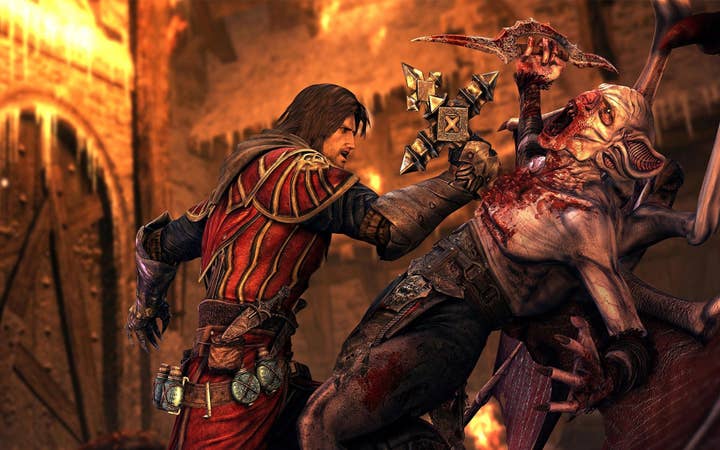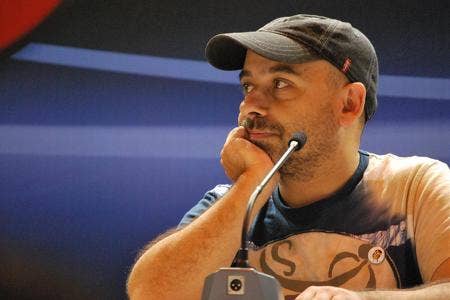Enric Alvarez: Mercury Rising
The Spanish designer on Castlevania, Konami and bringing back Dracula
At once laid back and intensely animated, Enric Alvarez adjusts his ubiquitous baseball cap and apologises again for his near-impeccable English. It's his last interview before a much delayed lunch, but an energy and sincerity still pervades his small frame.
Five or so years ago, we might not have found him in such a positive mood. Before his studio landed the Castlevania IP, scoring a critical and commercial success with the widely admired Lords of Shadow, it was lurking in the shadow of the lukewarm Jericho, just another work for hire studio hitting an average Metacritic. Now, with the best selling title in one of gaming's most storied franchises under his belt, and the personal approval of Hideo Kojima ringing in his ears, he's a decidedly happier man.
Here, GamesIndustry International sits down with Alvarez on his home turf in Barcelona, during last month's Gamelab festival, to talk about what brought his team back from the edge of obscurity.
Yeah - I think it was a huge risk! You have to think, at that time we weren't a proven developer. We'd made Clive Barker's Jericho, which was a flop. I have to admit, our relationship with Codemasters at a company level affected the quality of the game, but the game itself wasn't good.
The thing is, Konami knew us from before Jericho, so they were interested to see if we were up to the task of developing Castlevania, so we had to prove ourselves to them. We created a teaser showing our ideas for the game. Konami were very honest when they approached us. They didn't say, "we've got a design document this thick, and we're going to put our top guys from Japan in charge to tell you what to do. Instead, they were interested in what we wanted to do with the IP.
So when we developed the teaser, they liked it so we went for it. Initially, though, Konami wasn't sure. That's why it was originally just 'Lords of Shadow', without the Castlevania title. After a few months in development Mr Kojima came to a meeting, saw what we were doing and said: "this is clearly Castlevania, why don't we embrace that and brand it that way?"
After a few months in development Mr Kojima came to a meeting, saw what we were doing and said: "this is clearly Castlevania, why don't we embrace that and brand it that way?"
From day one, when Dave Cox came to the studio and we made the agreement to publish the game, we said that even though Konami wasn't sure about it as Castlevania, we should treat it like it was and not change anything. So from day one we also had the trilogy in mind. Dracula Rises, then Mirror of Fate, then Lords of Shadow 2. We wanted Dracula to be the star of the show - in previous games, he'd been there, but not centre stage.
Well the story is going to be quite different across the three, they're self-contained. It's like not having to watch Star Wars to enjoy The Empire Strikes Back, but if you do, it's better. You'll enjoy it more, especially the characters, you'll feel closer to them.
I can guarantee that people who play one game won't feel like they have to have played the others.
It's kind of 50/50. In one sense, Castlevania doesn't belong to us. It belongs to history - it's a 25 year old franchise, one of the oldest and most loved. It belongs to the people who've played it, and of course to Konami. We're just doing our take.
But our take, that's ours. It's our vision, our characters, our approach to combat and exploration. From an emotional perspective, we love it. We've been working with the universe for five years. Imagine if you live with someone for five years - either you love them or hate them. Luckily, in this case, we love it.
That's why we said, not long ago, that we're done with Castlevania once we release Lords of Shadow 2, because that's the story that we wanted to tell. We don't want to bore the audience, we don't want to get stuck in the franchise. We want to tell a story, then we want to go to other universes and meet their characters, tell their stories.
We'd probably kindly decline.

Not really! He wasn't very involved, on a day to day basis, with Lords of Shadow. He played a crucial role, because he gave us Konami's trust. He said "these guys can do it". When there's this much money involved, people get nervous very easily. If you're from Japan, dealing with a Spanish company, that's even worse - they're investing a lot of money in an external Western developer which doesn't have a great track record. Kojima said, trust these guys - they're doing something good. We're very grateful for that.
Also, he gave us a lot of advice. Things like facial animation etc, but he was always very hands-off. For the forthcoming games, I think it's fair enough to say that we're really flying by ourselves.
I think that on one hand, from a business perspective, you have to try and get as many people as possible. That's fair. Putting a product in the market at today's quality standards is hugely expensive - we're only here talking today because video games area a big business. We should be happy about that - it's not like it was 30 years ago when it was seen as a freak thing. It's become a business.
Business has its downsides. One of them is this problem. The way to keep having good games is to make sure that you pour your soul into them. If you love what you're doing, if you fill them with passion, will and talent, we'll be safe. Gaming audiences recognise and reward quality. Think about how many bad films you've sat through - you're happy to because it doesn't need any effort. You sit down and turn off. Now think about how many bad games you've played through. Not many.
The way to keep having good games is to make sure that you pour your soul into them. If you love what you're doing, if you fill them with passion, will and talent, we'll be safe.
It requires much more effort, more interaction. You have to engage your imagination, your emotions, you have to make an input and an effort. I think that when you make that effort you're more discerning.
Something like Call of Duty is a great game, and very hard to make, but it's a bit of a shame that you can't sell those numbers unless you make a shooter. It's a consequence of having a big enough industry to succeed.
Probably both. [laughs] That's the way we want to do it. We're ambitious.

Ha - I know where you're coming from. When you're talking business, you have to be very respectful, for many reasons. We're constantly talking about different options and proposals - you should never assume that something which is being talked about will definitely happen. At the same time, we're in an excellent position with Konami. We're very comfortable with them, we hope they're very comfortable with us. As far as our relationship with Konami goes, I think that the sky is the limit.

